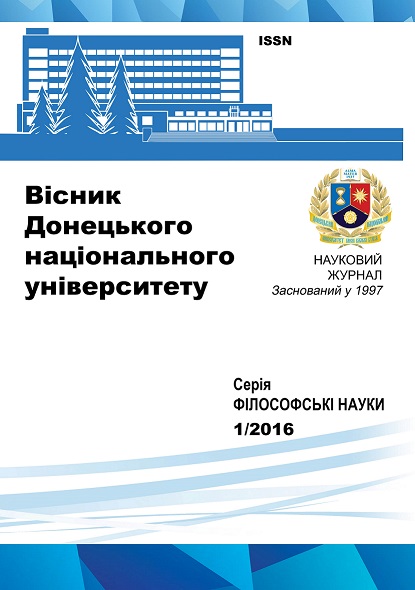Global Mobilization: Use of the Religious Rhetoric in the Age Global Collisions.
Keywords:
Secularization, globalization, projects of global development, Russian world, religious mobilizationAbstract
The world has entered a new stage of globalization – post-secular. Its main symptom is an appearance of civilization projects, which are alternative to Western. Chinese, Islamic and Russian projects are formed around religious and traditionalistic values and apply to people’s religious feelings. That’s why they can challenge Europe and the USA, which have much more resources. This thing has played an important role in spring of 2014 in Donetsk, where the mobilization potential has been used – religious activities, symbols, titles, calls etc., which roused citizens of Donbass to fight against “spiritually deprived West”. Events of 2014 in Donbass are one of many examples of usage of religious imperatives and values in the global struggle of a post-secular world. This article offers to look at Latin America as at unique cultural area, where for the first time in the history of religion’s rationalization – a necessary stage for religion’s establishment as a social phenomenon – grew into secularization – denial of religion’s crucial significance for the society. This process is described as a transformation of mental structures, which retain for a certain community an image of reality, so-called “social reality”. As a result, a secular social reality occurs, which allows reaching a unique degree of social practices’ unification. Expansion of secular social reality to other cultural areas, religious by their nature, forms a core of globalization’s process. The object of secular culture’s expansion becomes the rest of the world. Here, outside the world of Latin Christianity, secular tendencies are absent, but as a response to the aggressive invasion of secular culture, countersecularization processes form. In particular, two cultures, which were developing during centuries abreast with Western Europe, borrowing forms of the Western way of thinking, but still remaining their own independence, are considered – the world of Islam and the orthodox Muscovy (later Russia). The thesis concerning the fact, that in these cultures on the basis of Western conceptual apparatus new, alternative to Modernity projects of global development have been formed, which preserved their religious motivation, has been substantiated. Today to counter – Western cultural projects we can also refer Chinese project of “universal values”.
Alternative civilization projects use religious meanings and rhetoric to get competitive advantages in the competition with West. Since Europe and the USA have a huge potential of influence on the person – political, financial, economy, ideological and informational, their rivals are forced to focus on the most vulnerable part of human’s nature – religious and worldview persuasions. At the same time “Russian world” doesn’t refuse instruments, which were created within the frameworks of Western paradigm, that’s why it’s not a religious project, but more a religiously motivated project. At the same time, the events in Donetsk are one of the examples of the use of religious imperatives and values in the global conflict of the post-secular world. That’s why there’s a need to think of the ways to create tools and grounds, which will help to minimize axiological clashes of civilizations in future.
References
Ломанов А. В. Общий знаменатель нации: китайские ценности будут соперничать с западными / А. Ломанов // Россия в глобальной политике. – 2015. – № 5. – С. 138–152.
Выступление Святейшего Патриарха Кирилла на торжественном открытии III Ассамблеи Русского мира [Електронний ресурс]. – Режим доступу: http://www.patriarchia.ru/db/text/928446.html
Вододіли секуляризації / Український інститут стратегій глобального розвитку і адаптації. – Вінниця: Нілан-ЛТД, 2015. – С. 170–174.
Завелев И. А. Трансформация национальной идентичности и новая внешнеполитическая доктрина России / Игорь Завелев // Россия в глобальной политике. – 2014. – № 2 [Електронний ресурс]. – Режим доступу: http://www.globalaffairs.ru/number/Granitcy-russkogo-mira-16582

